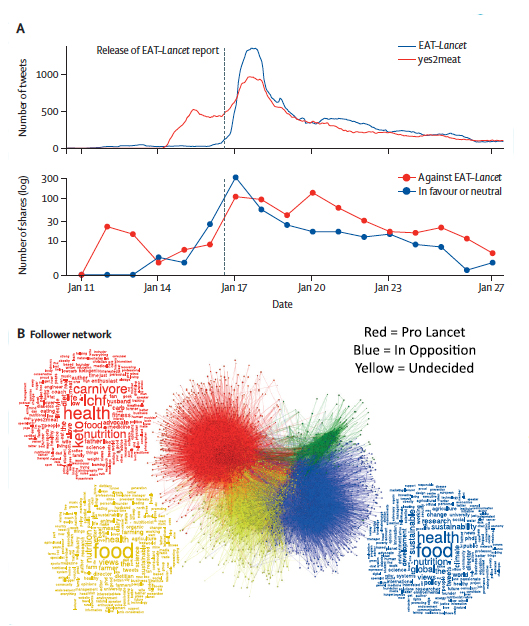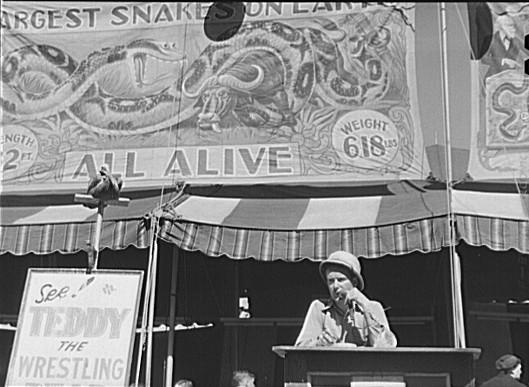Recently, The Lancet presented information on what experts considered a healthy and environmentally sustainable diet – plant-based, less meat. Because advocacy, even if grounded to varying degrees in scientific evidence, must be shared the article was accompanied by "several international launch events, including a social media campaign with its own hashtag: #EATLancet."
As you might expect, if you get your science from Twitter, there was a polarized response conveniently using the hashtag, “#yes2meat.” Researchers making use of Twitter tools and metrics, studied the "communications" of the 4278 Twitters using those hashtags as they generated 8.5 million Tweets.
The Results
"Our analysis confirms that a digital countermovement managed to organise rapidly, essentially dominating online discussions about the EAT-Lancet report in intriguing and worrying ways."

The "yes2meat" hashtag, as you can see, was generated about a week before the release of the Lancet article. The authors note that the hashtag was used to promote meat before Lancet published and rapidly became the term of choice for the opposition. But in a moment best described as conspiratorial, they write,
"First, it is evident that a counter-movement targeting the EAT-Lancet report began to organise around 1 week before its official launch date…”
How could that be? The report was, as all journal articles, under publication embargo until its release. Was there a mole involved?
As their infographic tried to convey, this newly arisen “skeptical” community tweeted more often and had a greater reach. Using Twitter tools, they found these tweets coming not from bots but real people and note that the yellow group, the undecided, more often retweeted for rather than against meat. They conclude that the polarization of health issues on Twitter is a growing problem.
Because this was a correspondence, rather than article, much of the supporting data was available only in the supplement, a click away if you are so inclined. I was inclined.
Supplemental Information
I have condensed the information. First, consider the number of tweeters and tweets. With users in the millions, and over 8,000 Tweets a second, the Tweeters and Tweets are vanishingly small. It would seem that the actual discussion was unimportant, except for the proponents and opponents.

Both groups tweeted their position equal percentage of the time, 58%, but the pro-meat tweeters were a lot  busier, with about three times more tweets, after removing the irrelevant. To get a sense of how diffusely those messages were retweeted, the researchers calculated how many followers were attached to each tweet and found that the “yes2meat” cumulative reach was higher than the pro-Lancet group. But when looking at where the links were directed, you see that both groups were preaching to the choir, talking past, not to one another.
busier, with about three times more tweets, after removing the irrelevant. To get a sense of how diffusely those messages were retweeted, the researchers calculated how many followers were attached to each tweet and found that the “yes2meat” cumulative reach was higher than the pro-Lancet group. But when looking at where the links were directed, you see that both groups were preaching to the choir, talking past, not to one another.
The supplement reports the most shared websites among all the tweets. The pro-Lancet tweets most often referred back to the original Lancet article or reports on the article by Harvard’s School of Public Health and The Guardian. The “yes2meat” tweets referenced back to an entangled group including the Diet Doctor, The Nutrition Coalition, the European Food Agency News (which despite its name is not a governmental agency, the European Food Safety Authority is) and the Sustainable Dish, a commercial blog with a Paleo diet bent. While both group's links were self-referential, at least, the Lancet’s self-serving is clear; you have to spend several minutes untangling the relationships within the opposition. And for the absolutely cynical, the source of this Lancet correspondence, is an institution that contributed 7 of the 37 authors to Lancet’s initial report. No wonder they are concerned about disinformation.
Social media is an echo chamber, not a delivery device.
We needn’t worry that false misinformation is being spread to the undecided, we are too engaged with our tribal brothers and sisters to listen to others. Your authority on Twitter comes from the size of your tribe and how frequently you Tweet. Twitter favors influencers over knowledge. Twitter is neither fair or balanced; it is not a source of information; it is, at best, a source of opinion. Twitter is a weak channel for communicating science and health; maybe journals and scientists should find better outlets.
Sources: "EATLancet vs. yes2meat: the digital backlash to the planetary health diet" Lancet DOI: 10.1016/S0140-6736(19)3256-7 and its Supplemental Appendix




